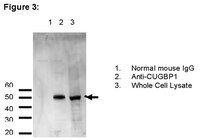RNA-binding proteins regulate the expression of the immune activating ligand MICB.
Nachmani, D; Gutschner, T; Reches, A; Diederichs, S; Mandelboim, O
Nature communications
5
4186
2014
Mostrar resumen
The recognition of stress-induced ligands by the activating receptor NKG2D expressed on cytotoxic lymphocytes is crucial for the prevention and containment of various diseases and is also one of the best-studied examples of how danger is sensed by the immune system. Still, however, the mechanisms leading to the expression of the NKG2D ligands are far from being completely understood. Here, we use an unbiased and systematic RNA pull-down approach combined with mass spectrometry to identify six RNA-binding proteins (RBPs) that bind and regulate the expression of MICB, one of the major stress-induced ligands of NKG2D. We further demonstrate that at least two of the identified RBPs function during genotoxic stress. Our data provide insights into stress recognition and hopefully open new therapeutic venues. | Western Blotting | 24924487
 |
Sulfated polysaccharides from red microalgae have antiinflammatory properties in vitro and in vivo.
Mary S Matsui,Neelam Muizzuddin,Shoshana Arad,Kenneth Marenus
Applied biochemistry and biotechnology
104
2003
Mostrar resumen
The primary goal of the present research was to determine whether sulfated polysaccharides derived from red microalgae possess antiinflammatory properties when directed against specific parameters of human skin inflammation. These unique biopolymers were studied in both in vitro and in vivo models of skin inflammation. Human subjects were recruited to participate in a study in which the polysaccharide material was applied topically and shown to inhibit cutaneous erythema induced by a known irritant. Leukocyte migration from capillary blood into sites of inflammation is an essential component of the inflammatory process and occurs in a series of steps, two of which are adhesion and chemotaxis. In vitro, the polysaccharide material primarily inhibited the migration of polymorphonuclear leukocytes (PMNs) toward a standard chemoattractant molecule and also partially blocked adhesion of PMNs to endothelial cells. The data obtained strongly suggest that sulfated polysaccharides derived from red microalgae have significant beneficial potential for use in topical products. In addition, the data suggested that the antiinflammatory mechanism for the polysaccharide was, at least in part, due to inhibition of circulating immune cell recruitment toward inflammatory stimuli. | | 12495202
 |
Immobilization of glutaryl-7-aminocephalosporanic acid acylase on silica gel and enhancement of its stability.
Seung Won Park,Jee Won Lee,Suk In Hong,Seung Wook Kim
Applied biochemistry and biotechnology
104
2003
Mostrar resumen
Glutaryl-7-aminocephalosporanic acid (GL-7-ACA) acylase is an enzyme that converts GL-7-ACA to 7-aminocephalosporanic acid, a starting material for semisynthetic cephalosporin antibiotics. In this study, optimal conditions for the immobilization of GL-7-ACA acylase were determined by experimental observations and statistical methods. The optimal conditions were as follows: 1.1 M phosphate buffer (pH 8.3) as buffer solution, immobilization temperature of 20 degrees C, and immobilization time of 120 min. Unreacted aldehyde groups were quenched by reaction with a low-molecular-weight material such as L-lysine, glycine, and ethanolamine after immobilization in order to enhance the activity of immobilized GL-7-ACA acylase. The activities of immobilized GL-7-ACA acylase obtained by using the low-molecular-weight materials were higher than those obtained by immobilized GL-7-ACA acylase not treated with low-molecular-weight materials. In particular, the highest activity of immobilized GL-7-ACA acylase was obtained using 0.4% (v/v) ethanolamine. We also investigated the effect of sodium cyanoborohydride in order to increase the stability of the linkage between the enzyme and the support. The effect on operational stability was obvious: the activity of immobilized GL-7-ACA acylase treated with 4% (w/w) sodium cyanoborohydride remained almost 100% after 20 times of reuse. | | 12665670
 |












